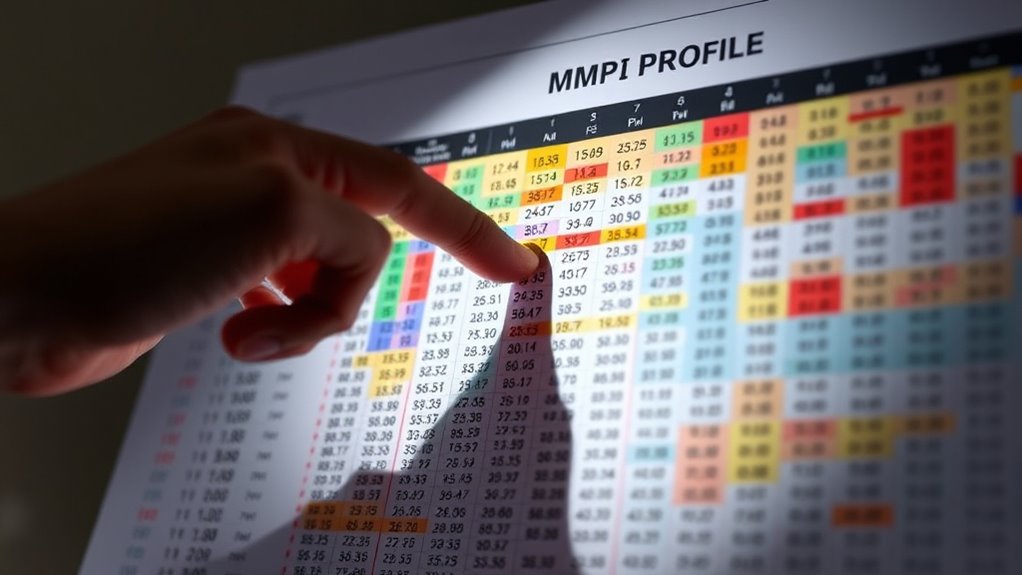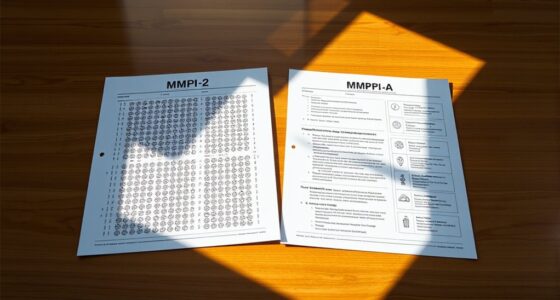MMPI profile codes are shorthand tools that help you understand personality traits and mental health patterns based on your questionnaire responses. Each code, like 4-9 or 2-8, points to specific emotional or social tendencies, giving your clinician quick clues about your strengths or concerns. These codes don’t diagnose but guide ongoing evaluation and treatment. If you want to see what these codes reveal about you, keep exploring how they connect to your psychological profile.
Key Takeaways
- MMPI profile codes are two- or three-digit shorthand representing specific personality traits and symptom patterns.
- They help identify areas of concern or strength in mental health assessments without providing definitive diagnoses.
- Codes like 4-9 suggest anxiety, while 2-8 may indicate social withdrawal or feelings of alienation.
- They are used alongside other clinical information to create a comprehensive understanding of an individual’s mental health.
- Profile codes support personalized treatment planning and targeted interventions by highlighting psychological patterns.

The MMPI profile codes are essential tools used by psychologists to interpret a person’s personality structure and mental health status. When you undergo a personality assessment with the MMPI, your responses are analyzed to generate a profile that reveals underlying patterns related to your emotional functioning, behavioral tendencies, and thought processes. These profile codes, typically composed of two or three digits, act as a shorthand for complex psychological traits and symptom patterns, allowing clinicians to quickly identify areas of concern or strength. Understanding what these codes mean can give you insight into how mental health diagnostics work and what your results might indicate about your overall psychological well-being.
MMPI profile codes help interpret personality traits and mental health patterns efficiently.
As you review your MMPI profile, you’ll notice specific codes that correspond to certain psychological conditions or personality traits. For example, a code like 4-9 might suggest tendencies toward anxiety and emotional distress, while 2-8 could indicate issues with social withdrawal or feelings of alienation. These codes don’t diagnose you outright but serve as clues that help mental health professionals formulate a holistic understanding of your mental health. They consider these codes alongside other clinical information, such as your history and current circumstances, to develop an accurate assessment.
Knowing your profile codes can also help you better understand the results of your personality assessment. If certain codes point to vulnerabilities or stressors, your therapist or counselor can tailor treatment strategies to target those specific areas. This personalized approach enhances mental health diagnostics by making interventions more precise and effective. For instance, if your profile indicates a high score in depression-related codes, your provider might recommend therapies focused on mood regulation or explore potential medication options. Conversely, if your codes reflect resilience or adaptive functioning, it reinforces strengths that can be integrated into your treatment plan.
It’s important to remember that MMPI profile codes are not definitive labels but rather indicators that guide further exploration. Your results are part of a broader clinical picture, and mental health diagnostics involve multiple sources of information. By understanding what your profile codes mean, you’re empowered to participate actively in your mental health journey. You can ask questions, seek clarification, and collaborate with your mental health provider to understand how these codes relate to your experiences. Additionally, AI-driven assessments are increasingly used to complement traditional methods, providing more comprehensive insights into mental health diagnostics. Ultimately, these profile codes serve as valuable tools in the ongoing effort to understand you better and support your mental health in a meaningful way.
Frequently Asked Questions
How Accurate Are MMPI Profile Codes in Predicting Mental Health Disorders?
You can generally trust MMPI profile codes to provide a reliable indication of mental health issues, but their accuracy depends on test reliability and cultural validity. While the MMPI is a well-established tool, cultural differences can influence responses, potentially affecting prediction accuracy. Consequently, you should interpret profile codes alongside clinical interviews and other assessments to guarantee a thorough understanding of mental health status.
Can MMPI Profile Codes Change Over Time With Treatment?
Imagine your profile code as a snapshot of your mind’s landscape. With effective treatment, this landscape can shift—mountains may soften, rivers reroute. Profile code stability isn’t fixed; it reflects your mental health at a moment in time. As you work through therapy, your codes can change, revealing progress and new insights. So yes, treatment impacts your profile, making it a dynamic tool for tracking your journey.
Are MMPI Results Applicable Across Different Cultures and Backgrounds?
Yes, MMPI results can be affected by cultural differences and language barriers. You should consider that cultural norms influence how questions are interpreted and answered. Language barriers may lead to misunderstandings, making the results less accurate. It’s important to use culturally adapted versions of the MMPI or interpret results with cultural context in mind. Doing so helps guarantee that the assessment reflects your true psychological profile.
What Are Common Misconceptions About Interpreting MMPI Profile Codes?
Imagine thinking a single map guides all travelers—wrong! Common misconceptions about MMPI profile codes include believing they perfectly predict behavior or that test reliability is flawless across cultures. In reality, you must consider cultural considerations and recognize that interpretation isn’t set in stone. It’s a nuanced puzzle, not a crystal ball, so don’t fall for oversimplified ideas that these codes are universally definitive or infallible.
How Do Clinicians Use MMPI Profile Codes in Treatment Planning?
You use MMPI profile codes to inform personalized treatment by identifying specific psychological traits and concerns. This allows you to tailor interventions for diagnostic precision, addressing unique needs rather than applying generic strategies. By analyzing the profile codes, you can focus on areas requiring support, track progress over time, and adjust treatment plans accordingly. This targeted approach bolsters effectiveness and helps ensure your clients receive the most appropriate, individualized care.
Conclusion
Understanding MMPI profile codes gives you a clearer picture of mental health tendencies, helping you see the bigger picture rather than just the parts. By decoding these profiles, you gain insight into underlying patterns and behaviors, making it easier to address concerns proactively. Remember, knowledge is power—it’s better to be safe than sorry. So, take this information as a stepping stone toward greater self-awareness and effective support, because when you know the game, you’re already ahead of the curve.









